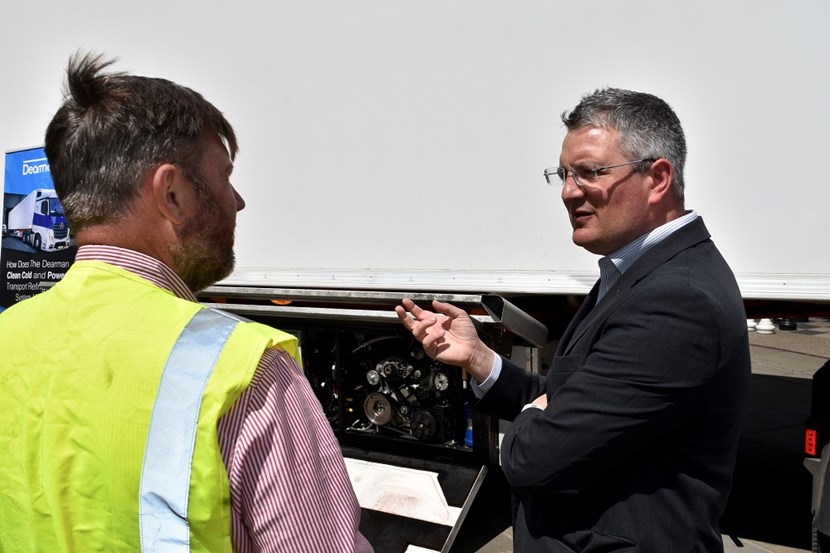
11 Sep 2018
New technology is the coolest way to tackle air pollution
Engines powered by liquid nitrogen could significantly reduce air pollution and are cost effective, a new Leeds City Council backed trial has found.
If it was widely rolled out across Leeds, the trial predicts the ground breaking technology could lower air pollution emissions by 19 tonnes every year.
Liquid nitrogen engines, developed by technology company Dearman, are designed to power transport refrigeration units (TRUs) used in lorries to keep food and other goods cold whilst it is on the road.
Currently TRUs are typically powered by diesel engines that are not subject to the same emissions standards as a vehicle's main engine. As a result, these secondary engines can emit up to six times the amount of air pollution.
In contrast, Dearman's innovative liquid nitrogen TRU engines emit no air pollution whatsoever and up to 80% less greenhouse gases than dirty diesel engines.
Running a vehicle equipped with a Dearman liquid nitrogen TRU as part of the fleet of a Yorkshire-based logistics company, the real world emissions from a truck running with the new technology and from a truck running with a TRU using conventional fossil fuel were compared.
The trial was undertaken as a partnership between Leeds City Council, Cenex and Dearman.
The nine month trial also found that the next generation of Dearman TRUs, ready in 2019, will be a approximately 20% cheaper to run than TRUs powered by unsubsidised diesel.
However, the report suggests that permitted use of government subsidised 'red diesel' (banned from use in primary engines but permitted for TRUs) could slow the uptake of this clean air technology.
Dearman and Leeds City Council will use the trial data as evidence in a bid to tackle the impact that TRUs have on local air quality. The results of the trial will also be further disseminated to support other local authorities keen to tackle emissions.
The trial was backed with a £150,000 air quality grant, awarded to Leeds City Council last year by the Department for Environment, Food and Rural Affairs (DEFRA).
Cllr James Lewis, Executive Member for Resources and Sustainability said:
"Leeds City Council is committed to tackling air pollution in order to protect the health of everyone in Leeds.
"New technologies will play a key role in enabling the council to reduce air pollution in the shortest possible timescale. Because of this, we are actively involved in several innovative trials just like this one.
"We will now work with the government to encourage the rollout of this new technology so that residents in Leeds, and across the country, can enjoy the benefits of cleaner air."
Scott Mac Meekin, CEO of Dearman added:
"We are pleased to have led this trial with a leading supplier of ice products who should be commended for reviewing its local environmental footprint.
"Leeds City Council has rightly identified second diesel engines on delivery lorries as a particular source of air pollution.
"This trial has given the council the evidence it needs to encourage government to take real action and support a switch to zero-emission alternatives instead.
ENDS
For media enquiries please contact:
Chad Newton
Communications and Marketing Officer, Leeds City Council
Email: chad.newton@leeds.gov.uk
Tel: 01133 789849
or
Mo Saqib
Policy & Communications Officer, Dearman
Email: mo.saqib@dearman.co.uk
Tel: 02038 290035
Notes for editors:
* This calculation assumes an average mileage of 7,800 miles per car, as identified in the Department for Transport's National Travel Survey: England 2017.
An online version of the full report can be found here.
About Dearman
- Dearman is a technology company delivering zero emission clean ‘cold and power’.
- Dearman’s cutting-edge technology uniquely harnesses liquid nitrogen to deliver zero-emission power and cooling. The company is developing a portfolio of proprietary technologies, products and services, which deliver significant reductions in fuel usage and emissions, at low capital cost.
- The first application of Dearman technology is a zero-emission transport refrigeration system, an alternative to traditional diesel units. It has the capacity to have a significant impact on air quality and CO2 emissions, while providing industry leading performance, but without adding significant cost.
- The Dearman technology is the basis for a suite of zero-emission power and cooling solutions being developed by the company, which have applications across transport and the built environment. Dearman has received significant inward investment and the company is building an international reputation for innovation, rigour, commercial acumen and engineering excellence, all to fulfil its primary objective – to make the world a cleaner, cooler place.
- The hazards involved in the use and transport of liquid nitrogen are well known and there are protocols around its use. If used sensibly—in appropriate applications and by trained individuals—liquid nitrogen is no more hazardous, and even safer than established fuels such as petrol, electricity or natural gas.
For media enquiries contact:
Leeds City Council Communications team
communicationsteam@leeds.gov.uk